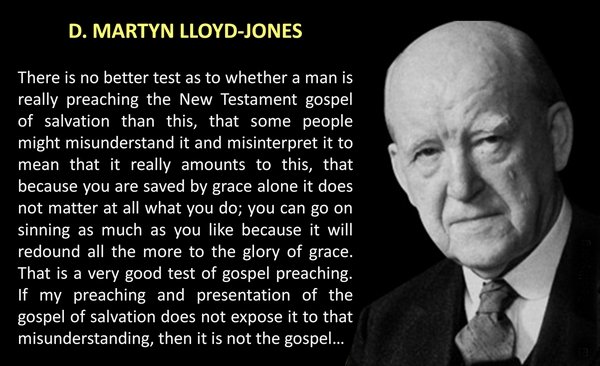As I promised in my last reblogged post – Religion and Faith – there’s a Difference! – here is the second of my expositions of the believer’s freedom under Grace, my classic article ‘Licence to Sin’. This piece explores the claim that critics of Grace make, where they assert that Grace is a ‘Licence to Sin’, even though their own Rulebook is full of the concept of Grace; the unearned favour of God.
Licence to Sin
[Author’s Note: In this article, please bear with the different spellings of the word ‘Licence’ on the graphics. This is because the people who made those graphics spell it differently; the correct use is explained at the end of this post]
This is a piece I have wanted to write for quite some time, and I have had to crystallise my thinking on this over a period of months. I hope it was worth it!
I am quite free in declaring my total reliance on God’s Grace under which I live my life. Not that I bring it up as a conversation starter, of course, because that makes people’s eyes glaze over. However, many conversations in a faith context do eventually get round to the subject of Law vs. Grace.
It’s usual that someone will claim that a certain hobby/habit/preference/attitude/word, whatever, is ‘wrong’ or ‘sinful’, ‘because it says so in the Bible’, or because they personally don’t like it (in other words, rules made by men (Mt15:9)). Or, to put this another way, even though they are ‘saved’, there are still certain Rules they must follow (and of course everyone else must follow them too!) – and for some people, not following those rules can (they believe) mean that they can ‘lose their salvation’.
I, however, believe that Grace covers everything. In short, I claim that, for a believer, everything is permissible, but not everything is beneficial (1Cor6:12; 1Cor10:23) . All sin past, present and future, has been forgiven (Is 43:25; Heb 8:12), and I am free to get on with living life in the Spirit without worrying about whether something is sinful or not, because I trust fully in the Spirit of Grace – in Whom I live my life – to steer me away from things that are harmful. Anything goes, essentially, but I don’t go everywhere, if you see what I mean.
It’s not surprising, then, that one of the first claims levelled at a Grace-living person like me is that this is essentially a ‘Licence to Sin’. I get that. Because I am free to do anything I choose, I am naturally going to go off and do loads of ‘sinful’ things, simply because I can.
And nothing could be further from the truth. Nor is it true for others who have been set free by the Spirit of Grace. I read on a Facebook group the other day about the ‘relentless, hard struggle against sin’. But, you know what, Jesus promised ‘rest’ (Mt11:28). And the key to that rest is this: to rest in His finished work, and to live your life of freedom in the Spirit. Being free from sin is not only having the desire to sin be removed, it is also – and especially – being free from the constant worry about whether something is sin or not. Just live life and trust the Spirit to keep you away from that which is harmful! As Paul says, ‘consider yourselves dead to sin, but alive to God in Christ Jesus’ (Rom 6:11). This isn’t as a Law or a Rule, it’s the natural position of the person who walks in Grace. The whole idea of Life in the Spirit is expounded in St. Paul’s letter to the Romans, and if it is read with the Grace filters in place, it all stands out so clearly. The problem with Romans, as with most/all other Scriptures, is that for centuries people have read them with their legalism filters in place, to find rules to live by and to impose on others. But Paul, as the Apostle of Grace, can also be read by those looking for Grace to live by.
Having just declared in the preceding verse that ” …[we] are not under Law, but under Grace”, Paul writes in Romans 6:15, “What then? Shall we sin because we are not under the law but under grace?” And this is exactly what the critics of living under Grace ask! Are you going to go ahead and sin because we are under Grace and not Law? And we, along with Paul, answer ‘No! By no means!’ But of course, and especially as Paul subsequently uses the example/illustration of slavery, critics will go on to say that obedience is key, but that’s not what Paul is saying here. He is directly answering those people who would accuse those living under Grace of having a Licence to Sin and he’s saying: NO!! It’s NOT a Licence to sin!
And the reason for that is because we are new creations!
Those in Christ are new creations; the old has gone, the new is come! (2Cor5:17) Those who look for rules to follow and conditions to impose in the Romans passages are missing the point. These people say you have to follow the Rules as written here. But the awesome, magnificent, amazing truth is this: It’s already been done! It’s a “fait accompli”! We are already new creations in Christ. The whole flavour of Paul’s writings is that these things are already in position. He doesn’t say that ‘one day, we will be free of sin’; ‘one day, we will be new creations’ or anything of the sort! No, it’s all been done for us by Jesus. We died with Him; we are also raised up with Him (Rom 6:8). In Colossians 2:9-15, Paul says this:
“For in Christ all the fullness of the Deity lives in bodily form, and in Christ you have been brought to fullness. He is the head over every power and authority. In him you were also circumcised with a circumcision not performed by human hands. Your whole self ruled by the flesh was put off [killed, amputated] when you were circumcised by Christ, having been buried with him in baptism, in which you were also raised with him through your faith in the working of God, who raised him from the dead.
“When you were dead in your sins and in the uncircumcision of your flesh, God made you alive with Christ. He forgave us all our sins, having canceled the charge of our legal indebtedness, which stood against us and condemned us; he has taken it away, nailing it to the cross. And having disarmed the powers and authorities, he made a public spectacle of them, triumphing over them by the cross.”
This is an example of how these ideas are presented as already having been accomplished. How then can we not realise that these things are already true of us? I know I don’t believe that “the Bible clearly says…” all that much at all, but surely if these things are true, as written by Paul, then they are completely liberating, completely freeing? It’s already been done!
When Paul says in Romans 6:14, “For sin shall no longer be your master, because you are not under the law, but under grace”, he’s not stating a Rule; he is making a statement of the true, actual nature of the believer. Someone might point out that ‘…the human heart is deceitful above all things’ (Jer 17:9) but for those under the New Covenant, this is no problem. I have a new heart; a new motivation for living my life. And so do you. “A new heart will I place in them” (Ezek 36:26). This is the New Creation; the new nature. “Therefore, if anyone is in Christ, he is a new creation; the old has passed away, and see, the new has come!” (2Cor 5:17). In fact, the entire chapter of Romans 6 is about Paul handling various objections to people living under Grace, probably objections of ‘religious’ types who want to put people under Law once more. Or at least he’s playing ‘Devil’s Advocate’ while building his argument moving from the ‘religious’ and legalistic point of view (as he himself used to be a part of and indeed endorsed, before meeting Jesus) and progressing into the concept of Life in the Spirit through Grace.
Bear in mind also that Paul says in his letter to Titus, “For the grace of God has appeared that offers salvation to all people. It teaches us to say “No” to ungodliness and worldly passions, and to live self-controlled, upright and godly lives in this present age…” (Titus 2:11-12). Did you see that? It is Grace itself that teaches us to say ‘No’; it is not Law, Rules, our flesh or anything else like that. Those efforts in our own strength are always doomed to failure. This is why Romans 6:14 is so true; it’s that sin shall not be our master because we are not under the rule of the Law, but under that of Grace instead, and it’s Grace that teaches us to say no to sin, not Law.
I also think that those who say that ‘Grace is a Licence to Sin’ don’t understand Grace. We have already seen above that it’s Grace that teaches us to say ‘No’ to sin. Because we are free to choose – we are no longer slaves to sin (Rom 6:6) – we now have the choice; we can choose our way, or we can choose God’s way. And if that means saying ‘No’ so sin, then Grace helps us learn that. Note that it is a learning curve. I’m not saying it’s trial and error that we use to find out what is sin and what is not, but living in the Spirit, following His prompts, doing what we see Father doing, effectively keeps us away from the desire to sin. That’s how Grace teaches us to say ‘No’ to it. The Spirit teaches us all things, including this!

But the other thing about sin is that we get ‘entangled’ by it (Heb 12:1). How, you might ask, can we be entangled by it when I have just said that we are free from it? Well, sin ‘so easily entangles’ us when we are focused on sin; ironically, when we are focused on the task of not sinning! If we are constantly checking to see if we are ‘sinning’ (or, worse, if others are ‘sinning’) then we are focused on the wrong thing, and we have no room in our lives for the freedom of the children of God, which is our birthright. This is also the trap into which the ‘sin police’ fall – those who point out sin in others. Part of being free of sin is that we don’t need to think about it any more – ours, or anyone else’s. We don’t need to worry about it; we just get on with living in the Spirit. And for those ‘sin-police’ who feel it is their duty to point out sin in others, just think: wouldn’t it be amazing, light and free to be rid of that burden? This is not your job! Why bear that burden any longer? Be free from it! Live in the light and freedom of the salvation that Jesus has given you, free of charge and free of obligation!
Granted, some may ‘point out’ Scriptures that appear to contradict these truths, but in reply I would say that these Scriptures I have used here today are true for me, in my experience. All I am doing by quoting Paul is to say, ‘Look, I have found this to be true in my own life, and hey look!, Paul found it to be true for him too!’ I am not finding a Scripture to ‘proof-text’ my ideas, I am saying that this is true for me and Paul found it true for himself too, and he wrote about it. I personally am free of entangling sin. Sure, I ‘sin’ occasionally, and this too is covered by Jesus (1Jn2:1). But my motivation, flowing from my new heart and new life in Christ, is to live life in the Spirit. Galatians 5:16 says that ‘If you walk by the Spirit, you will not gratify the desires of the flesh’. This is what it actually says! Why is it so hard for some people to appreciate that this is actually true? In denying this truth, and the other truths I have expressed here, surely these people are denying the very Scriptures they base their arguments on?
‘But surely’, some may say, ‘you can’t walk in the Spirit all the time?’ To this, I would reply, ‘Why not? Yes, of course you can!’ It’s really easy; you just live your life and trust God to work the Life of the Spirit out in your life as you go about your everyday business. It really is effortless; His yoke is indeed easy and His burden is light (Mt11:29-30). This is why it is often referred to as ‘working from a position of rest’. I rest secure in my Life in the Spirit; nothing and no-one can take it from me, including myself.
As we have seen, many Christians don’t understand this Grace [undeserved acceptance], and they think that this undeserved, unconditional sort of acceptance becomes a ‘licence to sin’. If there is no ‘penalty’ for wrongdoing, they claim, or no Rules to follow, then basically people who believe in Grace can just do what they want and get away with it. Interestingly, in some ways this is true; we can indeed ‘do what we want’ (1Cor10:23). But the consequences of sin are that our lives take damage; we get into destructive habits, thought patterns, behaviour structures and attitudes that are not good for us. So yes, sin has its consequences. And for that reason, not everything is beneficial (1Cor10:23).
There is a certain irony that following the Law is actually, in my view, the biggest ‘sin’ of all, because it is based in our pride in our own self’s ability to follow the Rules. And even then it is pointless, except maybe for making us feel good about ourselves and how ‘well’ we are doing, because no-one will be declared righteous by following the Law. (Rom 3:20) No-one. That’s quite clear to me.
We’ve seen the Scripture that says ‘Everything is permissible, but not everything is beneficial’ (1Cor6:12) but, well, how are you supposed to know the difference? And I think that even as God’s children, we do not grow as people unless we push the boundaries, like teenagers do. And sure, things are going to hurt us when we get things wrong. But God is there all the time. He’s a much more laid-back parent than evangelicalism gives Him credit for. Whatever happened to ‘underneath are the everlasting arms’? (Deut 33:27) What part of God’s love for us don’t they trust? My own answer is that it’s perfectly acceptable for us to push the boundaries; we are safe as Christians, and to be honest, what’s the worst that can happen? We suffer, we die; but we do that anyway. The very worst thing that could ever happen to me (Job 3:25) has already happened to me, and I am still here rejoicing and walking with the Lord. The only way we find out what is beneficial and what is harmful (or, if you like what is not sin and what is sin respectively) is to push the boundaries. And if God’s really not happy with something we’d like to ‘try’, then He’s perfectly capable of warning us off. And not, I hasten to add, by some set of Rules ripped out of context from the Bible, but as a conversation just like a parent with a child. This is what freedom looks like, and it’s why the controlling priests of evangelicalism don’t like it – because it puts an uncontrollable God back in command. God is perfectly capable of catching us and raising us up again when we fall.
This is not a ‘licence to sin’; it’s more a licence to learn.
Also remember – and this is key – that Jesus Himself is the personification of Grace. In some inexplicable way, being under Grace and being taught by Grace is also being under Jesus, and being taught by Him. Remember John 1:17 – “For the Law was given through Moses; Grace and Truth came through Jesus Christ”.
And I would also say that God is greater than all the ‘bad’ stuff we can do; all is forgiven, God keeps us safe, even should the ‘worst’ happen. This is pretty radical I know but it’s where I am at the moment. Once again, fear is not something that should exist in a Christian’s life, because perfect love drives out all fear (1John 4:18). And when people speak to us of ‘playing with fire’, ‘slippery slope’ and ‘dangerous ground’, they are pandering to fear, not Grace.
There’s a lot more on this subject here in one of my previous posts. I recommend you go and take a look; it’ll be well worth it!
And so, go ahead and LIVE in your freedom. Use the word ‘Freedom’ in my site’s search box to find other articles that I have written on this subject; you will find that the word figures very prominently in my writings. Freedom from sin is not a Licence to Sin. It doesn’t need to be; in fact it’s quite the opposite. Morality and Rules are the low road; Life in the Spirit under Grace is the high road.
God is for you, not against you (Rom 8:31). If what you are hearing, whether from your mind or from a preacher or other Law-based person, makes you feel otherwise, ignore it until you know that God loves you and His Grace empowers you to live the life He wants you to.
This is freedom.
This is your freedom.
Grab this with both hands and your teeth as well!
Take it and run with it!
Let me leave you with a quote from Mike Rough:
“If morality is your way of living, you are living way beneath your privileges. Living by love in the power of the Spirit is true living and there are no rules–there are none needed. The one who lives by love will live a life like Jesus lived which is so far above living by rules, the difference is like night and day!”
Can I also point out to you this excellent article by Paul Ellis, on the same subject. His writing is much clearer than mine 😉
The link to the original article is here








